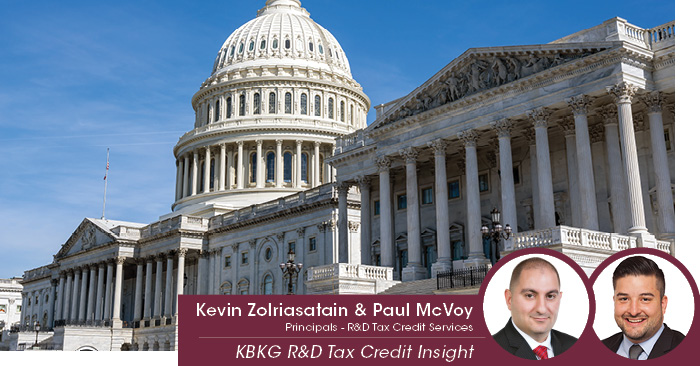By Kevin Zolriasatain and Paul McVoy | Principals, Research & Development Tax Credits
On March 10, 2025, a bipartisan group of lawmakers introduced the American Innovation and R&D Competitiveness Act of 2025 in the U.S. House of Representatives. The legislation aims to restore the immediate deductibility of research and experimental (R&E) expenditures and reverse the amortization requirement imposed by the 2017 Tax Cuts and Jobs Act (TCJA).
Prior to 2022, businesses could fully deduct their R&E expenses in the same year they were incurred. However, the TCJA mandated that starting in 2022, these expenses be amortized over 5 years for domestic research and 15 years for foreign research. This change significantly increased the tax burden on companies investing in innovation, potentially stifling economic growth and reducing the United States competitiveness on the global stage.
KBKG Insight:
The TCJA’s changes to R&D expensing rules have made the U.S. less competitive globally. Key economic rivals offer very lucrative incentives for research and development. China, for instance, offers a super deduction for research and development. Companies can deduct 200% of eligible R&D expenses (an additional 100% on top of the actual cost) from their taxable income. For manufacturing enterprises, the rate is even higher at plus 120% (totaling 220%).
Key Provisions of the Act
The proposed legislation includes several important provisions:
- Restoration of Immediate Expensing: The bill eliminates the mandatory five-year amortization requirement, reinstating the ability of businesses to deduct R&E costs immediately.
- Optional Amortization: Taxpayers may elect to amortize certain R&E expenses over at least 60 months if they choose.
- Exclusions: The bill does not apply to expenditures related to land acquisition, property improvements, or resource exploration (such as mining, oil, and gas).
- Tax Credit Adjustments: Changes to Section 280C ensure that businesses claiming R&D tax credits do not receive duplicate tax benefits.
- Retroactive Application: The amendments apply to tax years beginning after December 31, 2021, effectively reversing the TCJA’s amortization requirement.
Economic and Industry Impact
The reinstatement of immediate R&D expensing is expected to have significant positive effects on the U.S. economy, particularly in industries heavily reliant on innovation, such as technology, pharmaceuticals, and manufacturing. By reducing the tax burden on businesses, the legislation encourages greater investment in research, fostering technological advancements, job creation, and long-term economic growth.
Industry leaders and business advocacy groups have strongly supported the bill, emphasizing the ability to deduct R&D expenses immediately provides financial flexibility for companies looking to expand their innovation efforts. Furthermore, restoring full expensing ensures that the U.S. remains competitive with other nations that offer more favorable R&D tax treatments.
Legislative Outlook and Support
The bill has garnered bipartisan support, reflecting a shared recognition of the critical role that R&D plays in maintaining economic vitality. Lawmakers advocating for the legislation argue that fostering innovation is essential for strengthening U.S. technological leadership and economic resilience.
KBKG Insight:
The legislation faces significant hurdles in Congress amid expectations of a broader tax reform package. While the bill aims to restore immediate expensing for R&D costs, its passage faces an uphill climb due to competing legislative priorities and ongoing negotiations over comprehensive tax policy changes. However, given the historical bi-partisan support for immediate R&D expensing, there is reason for optimism that meaningful change could be forthcoming.
Conclusion
To ensure taxpayers receive the latest insights and guidance, KBKG and its specialists have tracked this and many other legislative developments. Taxpayers are advised to seek advice from a dedicated tax professional, such as those at KBKG, to effectively manage the intricacies of certain tax programs. For further details on KBKG’s services, reach out to an expert below.
About the Authors
Kevin Zolriasatain | Principal – Research & Development Tax Credits
Kevin Zolriasatain is a Principal and the Practice Leader of KBKG’s Research and Development (R&D) Tax Credit Services. Prior to KBKG, he spent nearly a decade at PricewaterhouseCoopers focusing on securing R&D Tax Credits for Fortune 500 companies. Kevin enjoys working with mall to mid-size business owners and, over his career, has documented hundreds of millions of dollars in research credits… Read More
Paul McVoy | Principal – Research & Development Tax Credits
Paul McVoy is a Principal for KBKG’s Tax Credit Consulting practice. In this role, Paul devotes his time to consulting companies in maximizing their R&D tax credit claims. Prior to joining KBKG, Paul was a manager at a Big Four accounting firm out of the Philadelphia, San Diego, and Los Angeles offices. Paul McVoy has spent nearly 20 years in public accounting, leveraging previous tax compliance… Read More




